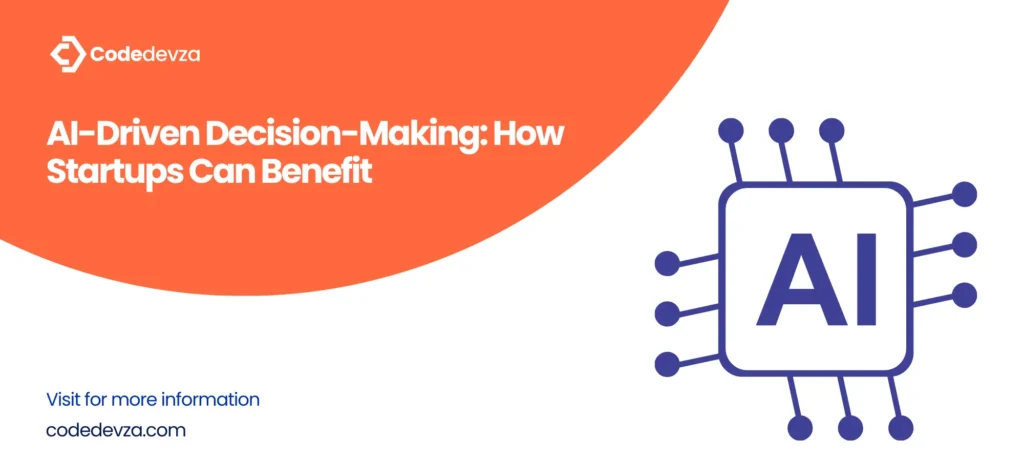In today’s fast-paced digital landscape, startups must make data-driven decisions quickly and accurately to remain competitive. Artificial Intelligence (AI) has revolutionized decision-making processes, providing startups with insights that were previously inaccessible. At CodeDevza, we believe that AI-driven decision-making is not just an option but a necessity for startups looking to scale effectively.
In this guide, we will explore the various ways startups can benefit from AI solutions, why AI is crucial for decision-making, and how it can enhance operational efficiency, reduce risks, and drive sustainable growth.
Why AI-Driven Decision-Making Matters for Startups
Startups often operate with limited resources, making every decision critical to success. AI solutions for startups provide an edge by enabling data-backed decision-making, automating complex processes, and offering predictive insights. Here’s why AI is essential for startup growth:
- Data-Driven Insights: AI processes vast amounts of data quickly, allowing startups to make informed decisions based on accurate predictions.
- Efficiency and Productivity: Automating repetitive tasks helps startups focus on innovation and core business activities.
- Risk Reduction: AI-powered predictive analytics can identify potential risks and mitigate them before they escalate.
- Personalization: AI enables startups to offer personalized customer experiences, increasing engagement and retention.
- Competitive Advantage: Leveraging AI-driven decision-making allows startups to outpace competitors by making faster and more effective strategic moves.
Key AI Solutions for Startups
AI-Powered Analytics and Business Intelligence
AI-driven analytics tools help startups extract meaningful insights from vast datasets. These tools can identify market trends, customer preferences, and operational inefficiencies, enabling better strategic planning.
Examples:
- AI-based dashboards for real-time performance tracking.
- Predictive analytics for demand forecasting.
- Sentiment analysis for customer feedback.
Automated Customer Support with AI Chatbots
Customer support is a crucial aspect of any startup. AI-powered chatbots and virtual assistants provide instant responses, reducing wait times and enhancing customer satisfaction.
Benefits:
- 24/7 customer support availability.
- Cost reduction in hiring and training customer service representatives.
- Improved response accuracy and consistency.
AI in Marketing and Sales Optimization
AI helps startups optimize marketing campaigns by analyzing consumer behavior and predicting purchasing trends. It also enhances sales by identifying the most promising leads.
AI Applications in Marketing & Sales:
- Personalized email marketing campaigns.
- AI-driven social media advertising optimization.
- Automated lead scoring and conversion prediction.
AI for Financial Decision-Making
Financial management is crucial for startups, and AI can help by analyzing financial data, detecting fraud, and optimizing budgeting strategies.
Use Cases:
- Automated expense tracking and budgeting.
- Fraud detection using machine learning algorithms.
- AI-driven investment recommendations.
AI-Powered Hiring and HR Management
Hiring the right talent is a challenge for startups. AI streamlines recruitment processes by analyzing resumes, predicting candidate success, and automating HR tasks.
AI in HR:
- AI-driven resume screening.
- Employee sentiment analysis.
- Performance tracking and career growth recommendations.
How Startups Can Implement AI-Driven Decision-Making
Assess Business Needs
Before integrating AI, startups should identify their primary pain points and determine which areas would benefit most from AI solutions.
Choose the Right AI Tools
Startups should select AI tools that align with their business goals. Popular AI platforms include Google AI, IBM Watson, and Microsoft Azure AI.
Integrate AI with Existing Systems
AI implementation should be seamless, ensuring that it integrates well with existing workflows, databases, and software.
Invest in Employee Training
Employees should be trained to use AI tools effectively, ensuring a smooth transition and maximizing AI’s potential.
Monitor and Optimize AI Performance
Regularly analyze AI’s impact on decision-making and adjust strategies based on data insights.
Challenges of AI Adoption in Startups
Despite its benefits, AI adoption presents some challenges:
- High Initial Costs: AI implementation can be expensive, but cloud-based AI solutions help reduce costs.
- Data Privacy Concerns: Ensuring compliance with data protection regulations is crucial.
- Technical Complexity: AI requires expertise, but many platforms offer user-friendly, no-code solutions.
- Change Management: Employees may resist AI integration; proper training and awareness programs can ease the transition.
The Future of AI-Driven Decision-Making in Startups
AI is continuously evolving, and its role in decision-making will only grow stronger. Emerging AI trends include:
- Explainable AI (XAI): Enhancing transparency in AI decision-making.
- AI and IoT Integration: Providing real-time data insights from smart devices.
- Autonomous AI Systems: Automating entire business operations with minimal human intervention.
- AI-Powered Predictive Maintenance: Reducing downtime in manufacturing and logistics startups.
Startups that leverage these trends will be well-positioned to thrive in an increasingly AI-driven world.
Conclusion
AI-driven decision-making is transforming how startups operate, enabling them to work smarter, reduce risks, and stay ahead of competitors. From AI-powered analytics to automated customer support and financial management, the possibilities are endless.
At Codedevza Technologies, we are committed to helping startups harness AI solutions for sustainable growth. By implementing AI in strategic decision-making, startups can unlock new opportunities and achieve long-term success.
FAQs!
Q. How can AI solutions benefit startups?
AI helps startups by providing data-driven insights, automating repetitive tasks, optimizing marketing strategies, and improving financial management.
Q. What are the best AI tools for startups?
Some popular AI tools include Google AI, IBM Watson, Microsoft Azure AI, and AI-driven analytics platforms like Tableau and Salesforce Einstein.
Q. How can startups implement AI without a large budget?
Startups can use cloud-based AI services, open-source AI tools, and no-code AI platforms to reduce implementation costs.
Q. What challenges do startups face in AI adoption?
Challenges include high initial costs, data privacy concerns, technical complexity, and employee resistance to change.
Q. What is the future of AI in startups?
AI trends such as explainable AI, IoT integration, and predictive analytics will shape the future of startup decision-making, offering more efficiency and innovation.


